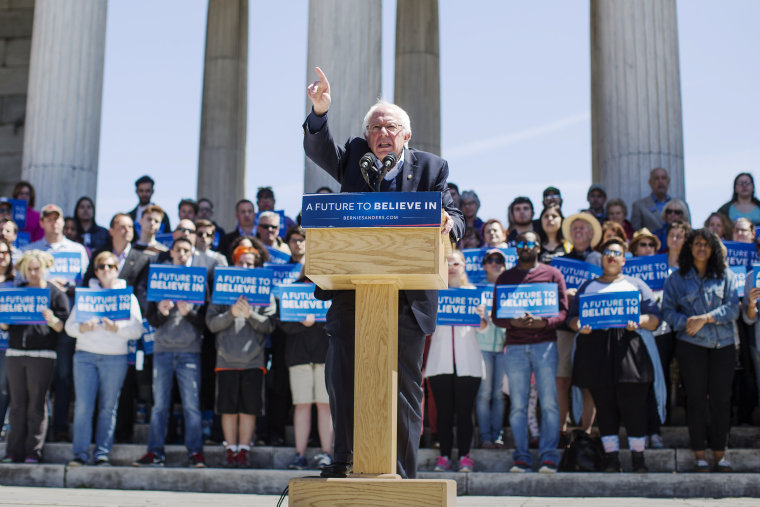After this week's primary results, the unyielding arithmetic left Bernie Sanders and his team with few options. They could launch some kind of scorched-earth campaign, or they could grudgingly concede that they're likely to finish a competitive second in the race for the Democratic nomination.
A day after Bernie Sanders won only one of five northeastern primary contests against rival Hillary Clinton, his campaign will lay off more than two hundred staffers in the effort to concentrate its remaining resources on upcoming contests, particularly the June 7 California primary. Sanders spokesman Michael Briggs told NBC News that the layoffs are part of a "right-sizing" in light of the dwindling number of remaining primary contests. "It's a posture of reality," Briggs said.
A total of 225 staffers were apparently let go yesterday during a brief conference call led by Sanders' campaign manager, Jeff Weaver. Joy Reid noted on the show last night that many of these paid aides were disappointed, not just by the loss of their job and the wind down in a campaign they believe in, but also because of the surprise: these staffers assumed they'd remain on the team through June, and they'd hoped to hear the bad news from Sanders himself.
Regardless, the senator told the New York Times that he would "refocus his efforts chiefly on the June 7 primary in California," even while competing in the other remaining states.
"If we can win the largest state in this country, that will send a real message to the American people," Sanders said, "and to the delegates that this is a campaign that is moving in the direction it should."
It's worth pausing to appreciate what, specifically, he means when he talks about "sending a message."
By all appearances, Sanders does not seriously expect superdelegates to intervene on his behalf, overriding the will of the voters to make him the Democratic nominee through fiat. Rather, when the senator talks about sending a message, he means a primary victory in California -- which is certainly possible -- would leave him in the best possible position to exert maximum influence going forward.
The challenge at this point is coming up with Team Sanders' wish list. In his statement after Tuesday's primaries, the senator emphasized fighting "for a progressive party platform," which is likely to spur some spirited intra-party discussion.
But in practical terms, the platform's significance is limited, and even if Sanders succeeds beautifully in shaping the document -- securing support for a $15 minimum wage, for example -- he'd probably be leaving political capital on the table.
The remaining question is incredibly straightforward: what else might Bernie Sanders ask for? As we discussed two weeks ago, part of the challenge in this case is that the senator could push for some election reforms -- making the process more democratic through fewer caucuses and the elimination of superdelegates -- but those changes would mean pushing to eliminate elements that directly benefited Sanders.
He might also demand more "open" primaries that allow participation from independents and Republicans, but those decisions are made on a state-by-state level -- and many Democratic officials are understandably reluctant to weaken the party's role in the process on purpose.
As Sanders transitions to the next phase, he and his team will likely invest a fair amount of time in coming up with a plan, not to win a nomination that appears out of reach, but rather to help change the party and the process. The senator may not know precisely what to ask for now, but he has a couple of months to put together a list.
